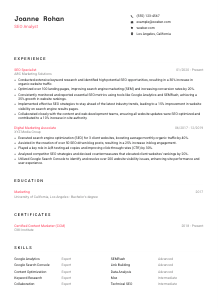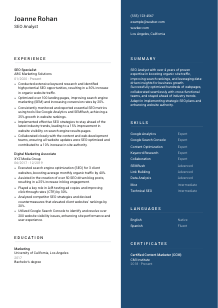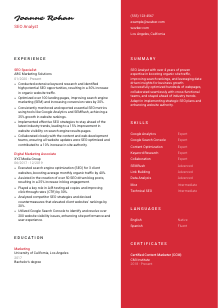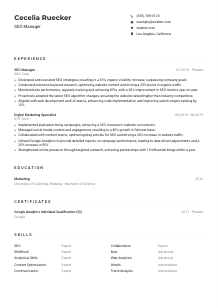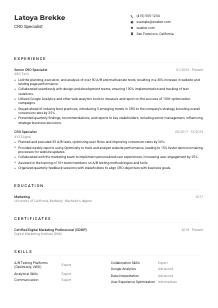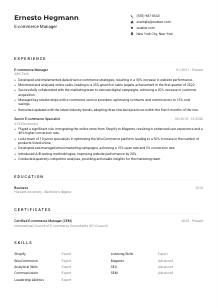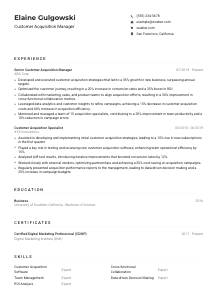SEO Analyst Resume Example
Cracking search engine codes, but your resume gets lost on page 2? Dive into this SEO Analyst resume example, optimized with Wozber free resume builder. Discover how to architect your digital marketing expertise to align with job requirements, propelling your career to rank higher than the most popular keywords!
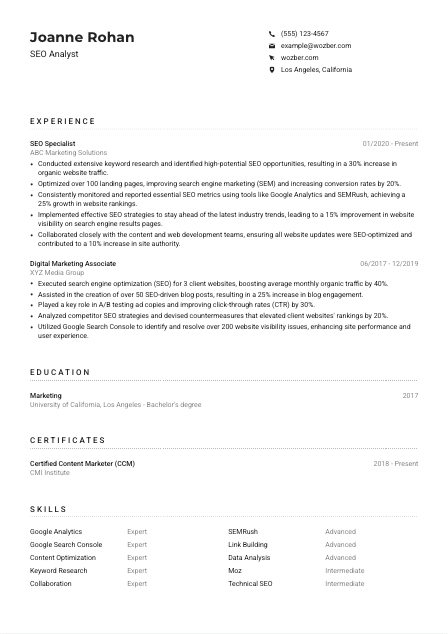
How to write a SEO Analyst resume?
Hello there, aspiring SEO Analyst! In the digital age, ensuring your resume stands out is not just a goal, but a necessity. Beyond being a piece of paper, your resume is your highlight reel, showcasing your journey and expertise in the SEO realm. With Wozber's free resume builder at your disposal, this guide is crafted to navigate you through the intricacies of designing a resume that not only meets the job's demands but sings your praises in the language of SEO.
Ready to optimize your resume for the top spot? Let's embark on this quest to turn your resume into the gateway for your dream SEO Analyst position.
Personal Details
First impressions matter. Your personal details section is akin to the meta tags on a webpage; it introduces you to the search engine (in this case, your potential employer). Let's hone this section to ensure you're immediately recognized as the SEO Analyst they're searching for.
1. Brand Yourself with Your Name
Think of your name as the <title> tag of your resume. It should leap off the page. Use clear typography, positioning your name prominently to ensure it's the first thing that catches the eye, much like a well-optimized webpage title.
2. Tailor Your Title
Below your name, list the position you're vying for, 'SEO Analyst', to align perfectly with the job listing and to reinforce your application's relevance. It's like targeting a specific keyword for better SERP rankings.
3. Make Contact Information Precise
Include your phone number and a professional email address in an easy-to-find spot. Think of this as optimizing your site's contact page for user experience – you want to be easily reachable.
4. Localize
By listing "Los Angeles, California" in your location, you align with the geographical requirement directly from the job description, reassuring potential employers of your availability in their region. It's similar to local SEO strategies that target specific locales.
5. Online Presence
Including your LinkedIn or a personal website provides a backlink to your professional online presence, offering a deeper dive into your career, much like a well-placed internal link strengthens a website's SEO.
Takeaway
Fine-tune your personal details as you would optimize a webpage for search engines. Each element, from your name to your location, contributes to the first impression. Position these details strategically to ensure you're immediately seen as the perfect candidate for the role.





Experience
Your experience section is where you demonstrate that you're not just any SEO Analyst; you're the one they need. By syncing your past achievements with the job description, you're essentially proving that you've already excelled in similar roles.
- Conducted extensive keyword research and identified high‑potential SEO opportunities, resulting in a 30% increase in organic website traffic.
- Optimized over 100 landing pages, improving search engine marketing (SEM) and increasing conversion rates by 20%.
- Consistently monitored and reported essential SEO metrics using tools like Google Analytics and SEMRush, achieving a 25% growth in website rankings.
- Implemented effective SEO strategies to stay ahead of the latest industry trends, leading to a 15% improvement in website visibility on search engine results pages.
- Collaborated closely with the content and web development teams, ensuring all website updates were SEO‑optimized and contributed to a 10% increase in site authority.
- Executed search engine optimization (SEO) for 3 client websites, boosting average monthly organic traffic by 40%.
- Assisted in the creation of over 50 SEO‑driven blog posts, resulting in a 25% increase in blog engagement.
- Played a key role in A/B testing ad copies and improving click‑through rates (CTR) by 30%.
- Analyzed competitor SEO strategies and devised countermeasures that elevated client websites' rankings by 20%.
- Utilized Google Search Console to identify and resolve over 200 website visibility issues, enhancing site performance and user experience.
1. Understand the Job Specs
Begin by dissecting the job requirements specified for the SEO Analyst position, like "Conduct keyword and market research" or "Optimize website content". These phrases are your keywords; align your experience with them.
2. Position and Company
Format each experience starting with your role, followed by the workplace, and the dates of your tenure. Present them like you would an SEO campaign case study, showcasing the when, where, and what.
3. Achievement Statements
Craft bullet points detailing your relevant accomplishments, mirroring the job posting's language. For instance, "Optimized over 100 landing pages, increasing conversion rates by 20%" parallels the job description, directly showcasing your applicable skills.
4. The Power of Numbers
Use quantifiable achievements to illustrate your impact distinctly. Numbers stand out and demonstrate growth, akin to proving your SEO campaigns' ROI with clear data points.
5. Relevance Is Key
Limit your experience to the cream of the crop that directly pertains to the job requirements. Similar to refining your site's content to boost SEO, curating relevant experiences strengthens your resume's impact.
Takeaway
Like optimizing a webpage, fine-tuning your experience section to match job descriptions can make your resume more visible to hiring managers. Each bullet point is an opportunity to showcase your SEO prowess. Highlight your success, backed by data, and align closely with the job's needs.
Education
Achieving the right education background is like laying down the foundational HTML for your website – essential for what comes next. In SEO, as in resumes, every detail matters. Here's how your education can reflect not just knowledge, but a perfect fit.
1. Match the Job Requirements
Identify the education requirement specified in the job description, such as a "Bachelor's degree in Marketing, Business, or related field." This is your keyword for this section, signaling a match between your qualifications and the job's needs.
2. Clear Structure
Organize your educational background starting with the most recent. Like clean, streamlined coding practices, a clear and concise presentation makes information easy to find and digest.
3. Degree Specifications
If your degree aligns exactly with the job description (like a "Bachelor's degree in Marketing"), highlight it prominently. It's like having a perfectly optimized meta description for a webpage – it attracts attention.
4. Relevant Extras
Consider additional elements that enhance your candidacy, such as relevant coursework or projects. These details are supplementary, much like supporting blog content that enhances your site's authority on a subject.
5. Other Achievements
Had you been a part of clubs, organizations, or undertook significant projects related to SEO? Mention them if you believe they'll add value, akin to showcasing badges or certifications on your site for added credibility.
Takeaway
Leverage your education section to reinforce your fit for the SEO Analyst role, showcasing not just your formal education but also your initiative and involvement in relevant areas. Treat this section as the structured data that reinforces the main content of your resume 'page'.
Certificates
In the world of SEO, staying updated with the latest certifications is akin to keeping abreast with Google's constantly evolving algorithms. Highlighting specific, relevant certifications on your resume is critical to prove your expertise and dedication to the field.
1. Sift Through the Requirements
First, pinpoint if the job listing specifically mentions any required certifications. While our example doesn't explicitly cite this, always tailor this section to meet any directly specified needs.
2. Highlight Pertinent Certifications
Choose to display certificates that resonate most with the job's needs, such as a "Certified Content Marketer" for an SEO Analyst role. This shows your specialized knowledge and initiative in reinforcing relevant skills.
3. Validity and Recency
Mention acquisition dates, particularly for certifications with limited validity, to demonstrate your currency with industry standards. It's similar to updating your site to ensure it meets the latest SEO guidelines.
4. Continuous Learning
SEO is an ever-evolving field. Regularly seek out certifications and learning opportunities that keep you at the cutting edge, indicating a commitment to your personal and professional growth.
Takeaway
Similar to staying abreast of SEO trends, keeping your certifications up-to-date demonstrates your dedication to best practices and continuous improvement. Highlighting relevant certifications can set you apart in a competitive job market.
Skills
Your skills section is the keyword list of your resume – it should be optimized to match exactly what the position is looking for. Here's how to ensure your skills shine as brightly as the top-page search results.
1. Extract From Job Listing
Scour the job description for specific skills required, such as proficiency with "Google Analytics" or "Keyword Research". These are your primary keywords.
2. Mirror Job Requirements
Ensure the skills you list are a direct match for the job's requirements. This customized approach demonstrates that you're not just a fit; you're the perfect candidate for the job.
3. Precision and Organization
Resist the urge to list all your skills. Instead, curate a focused list that prioritizes relevance to the job. Think of this as optimizing your site's content: quality, not quantity, ranks you higher.
Takeaway
See your skills section as a targeted ad campaign for your candidacy. Trim, tailor, and tune it to convince the hiring manager that you're not just capable – you're exactly what they've been searching for.
Languages
In the global market, language skills can significantly boost your SEO capabilities, much like multi-language support can elevate website accessibility and reach. Here's how to showcase your linguistic prowess in a way that adds value to your resume for an SEO Analyst position.
1. Job Listing Prerequisites
Firstly, identify if the job description highlights any specific language needs. Our example requires proficiency in English, underscoring the critical nature of this skill for the role.
2. Prioritize
List English at the top as your proficiency directly meets the job requirement. It's about matching your resume's content with the 'search query' of the job listing.
3. Add Value with Additional Languages
Even if not requested, additional languages showcase versatility and can be beneficial for global SEO campaigns. List these under English to show breadth without detracting from the primary requirement.
4. Be Transparent
Clearly define your level of proficiency for each language using straightforward terms. Precision here can help avoid misunderstandings, much like clear, concise meta descriptions aid user click-through.
5. Role's Scope
Consider the broader implications of your language skills in relation to the job. Switching between languages effortlessly can be a major asset in international SEO strategies.
Takeaway
Your linguistic skills are a testament to your ability to engage with a global audience, a valuable asset in the interconnected SEO world. Highlighting these effectively on your resume can distinctly advantage your candidacy in a field that thrives on communication.
Summary
In the fast-scrolling world of HR and recruiters, your summary is the hook that grabs attention. It's the snippet that makes someone click on your website in the search results. Crafting a compelling summary is essential for getting noticed.
1. Capture the Role's Essence
Digest the job description to understand the core capabilities sought. This insight will help you frame your expertise in the context of the job's unique demands.
2. Start Strong
Begin with a statement that encapsulates who you are professionally. For example, "SEO Analyst with over 4 years of proven expertise" directly mirrors the job's language, tuning your narrative to resonate with potential employers.
3. Reference Key Skills and Achievements
Follow up with a brief listing of your skills and notable accomplishments. This segment is like showcasing your webpage's best features above the fold, ensuring they catch the user's eye immediately.
4. Conciseness
Keep your summary tight and impactful. Aim for 3-5 lines rich in substance, providing a teaser of your capabilities and achievements. It's your chance to make them want to 'click' for more.
Takeaway
Your summary is your pitch, your chance to make a memorable first impression. Shape it to capture the essence of your professional journey and the unique value you bring to the SEO Analyst role. Craft this section with care, and you'll set the stage for a successful application.
Launching Your SEO Analyst Journey
Congratulations on completing this deep dive into building a standout resume for an SEO Analyst position! Equipped with these insights and Wozber's tools, including free ATS-friendly resume templates and an ATS resume scanner, you're well-prepared to craft a resume that not only ticks all boxes but also showcases your unique capabilities. Remember, your resume is the narrative of your professional journey. Fine-tune it, add your unique touch, and use it as a launchpad for your next career milestone.
The SEO world is dynamic and ever-changing; let your resume reflect your ability to thrive in this environment. Ready to make your mark? Your next big opportunity awaits!

- Bachelor's degree in Marketing, Business, or related field.
- Minimum of 3 years of experience in SEO, preferably in agency or e-commerce environments.
- Proficiency with SEO tools such as Google Analytics, Google Search Console, SEMRush, and Moz.
- Strong analytical skills with the ability to analyze data and make data-driven decisions.
- Excellent written and verbal communication skills to effectively collaborate with cross-functional teams and present findings.
- Must be adept in English.
- Must be located in Los Angeles, California.
- Conduct keyword and market research to identify potential SEO opportunities.
- Optimize website content, landing pages, and paid search copy for search engine marketing (SEM).
- Monitor and report on SEO metrics, including organic traffic, rankings, and conversion rates.
- Stay updated on the latest SEO trends and search algorithm updates, implementing changes to optimize organic search results.
- Collaborate with content and web development teams to ensure website and content are SEO-optimized.





